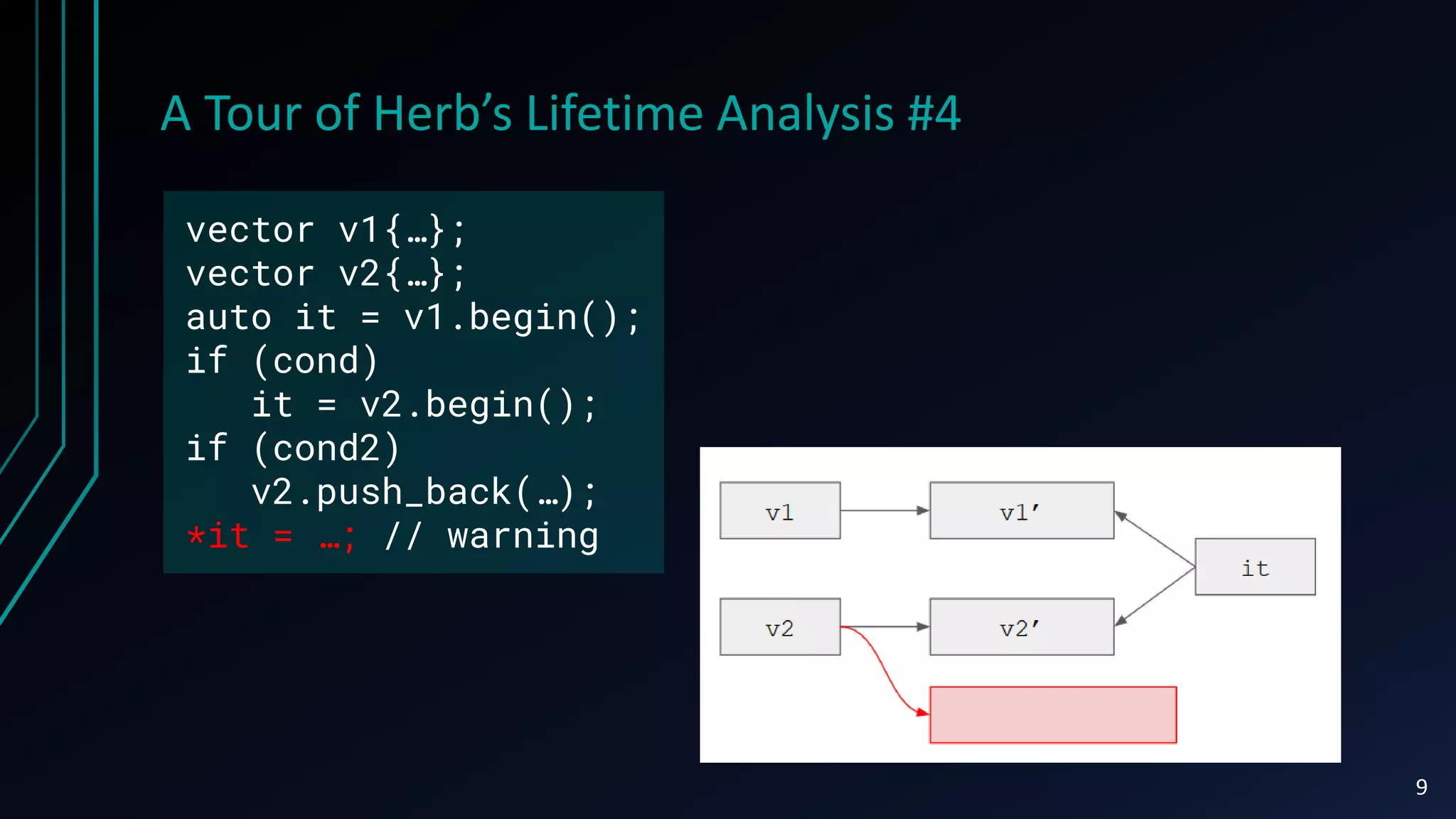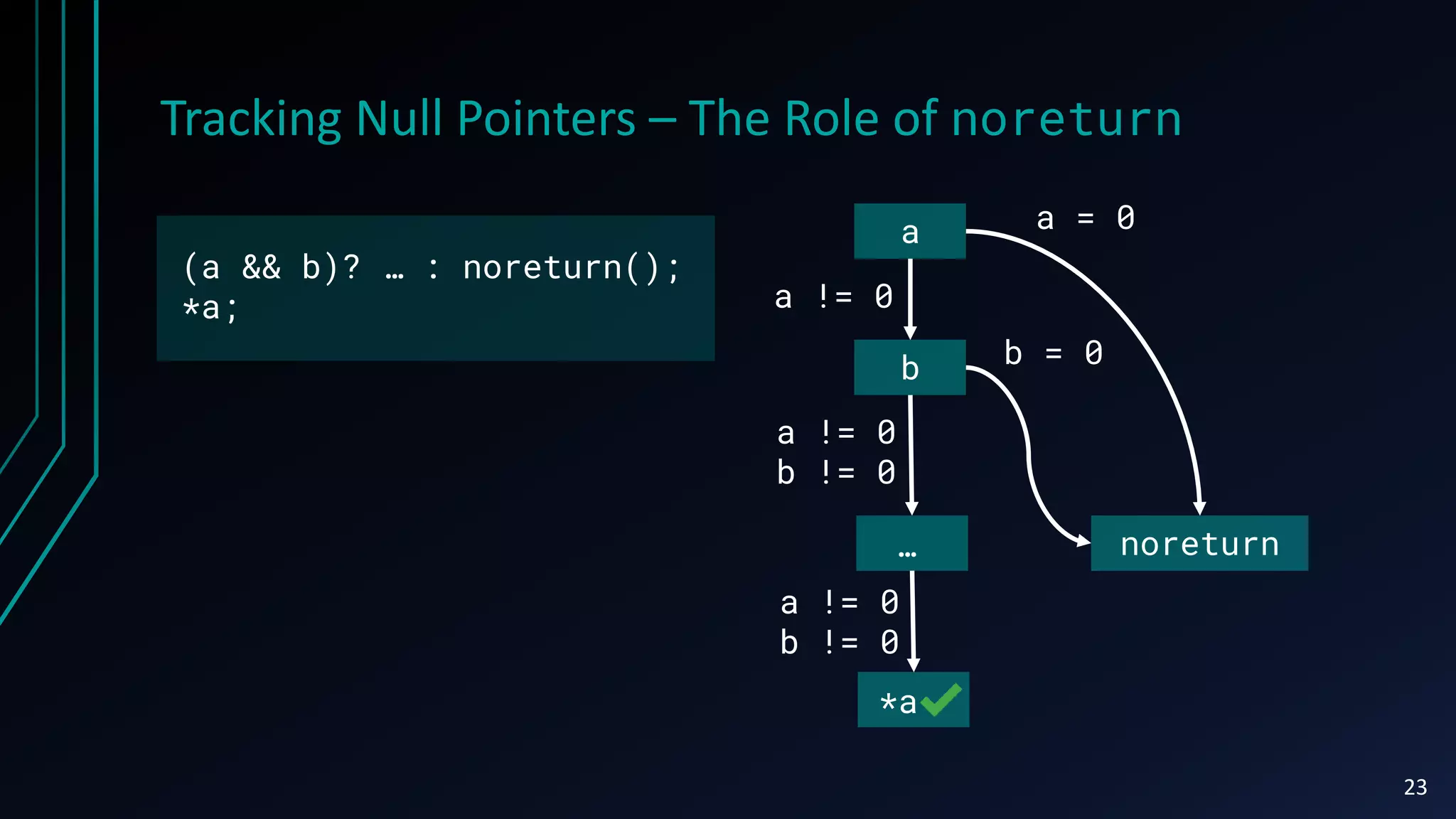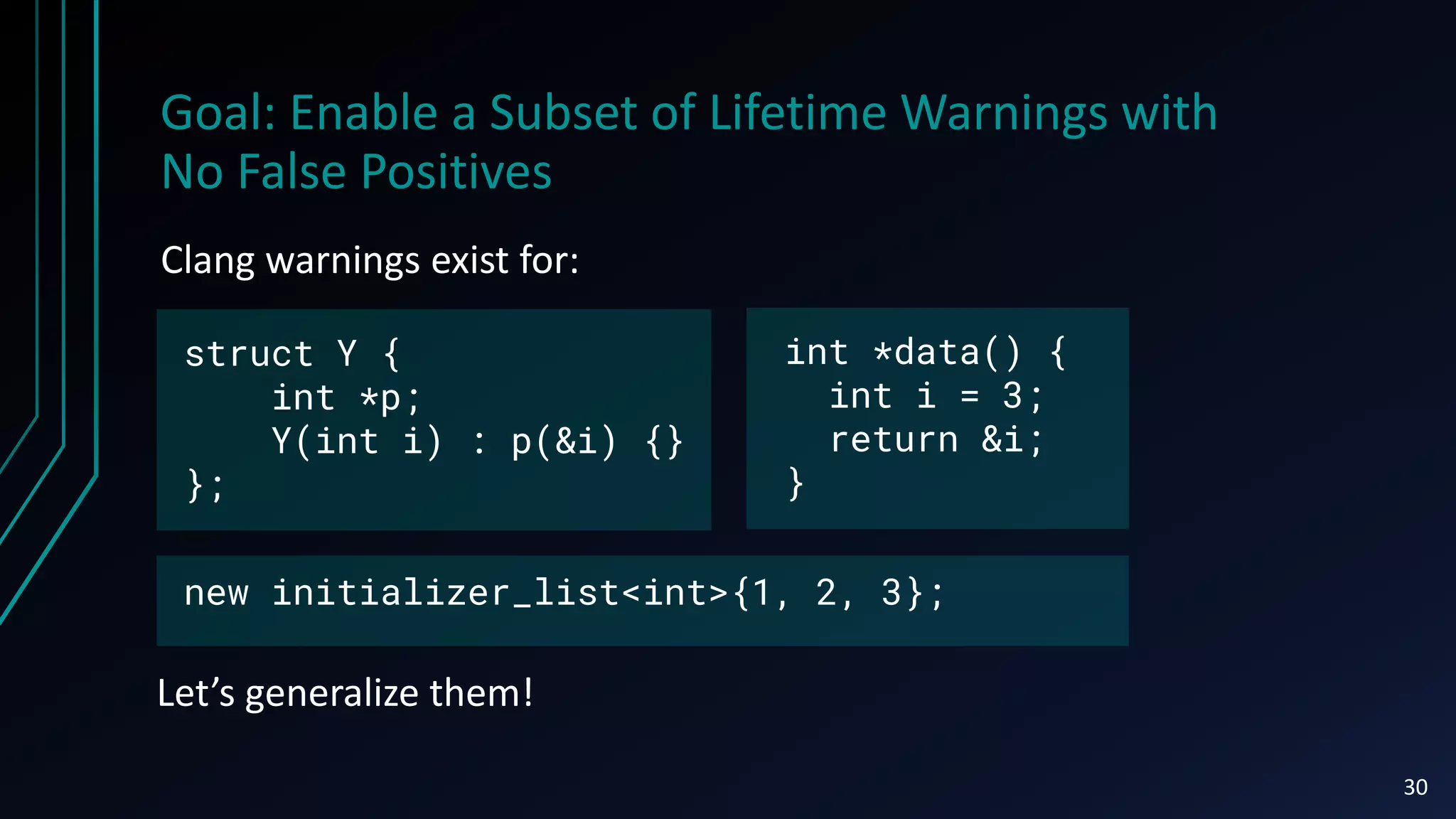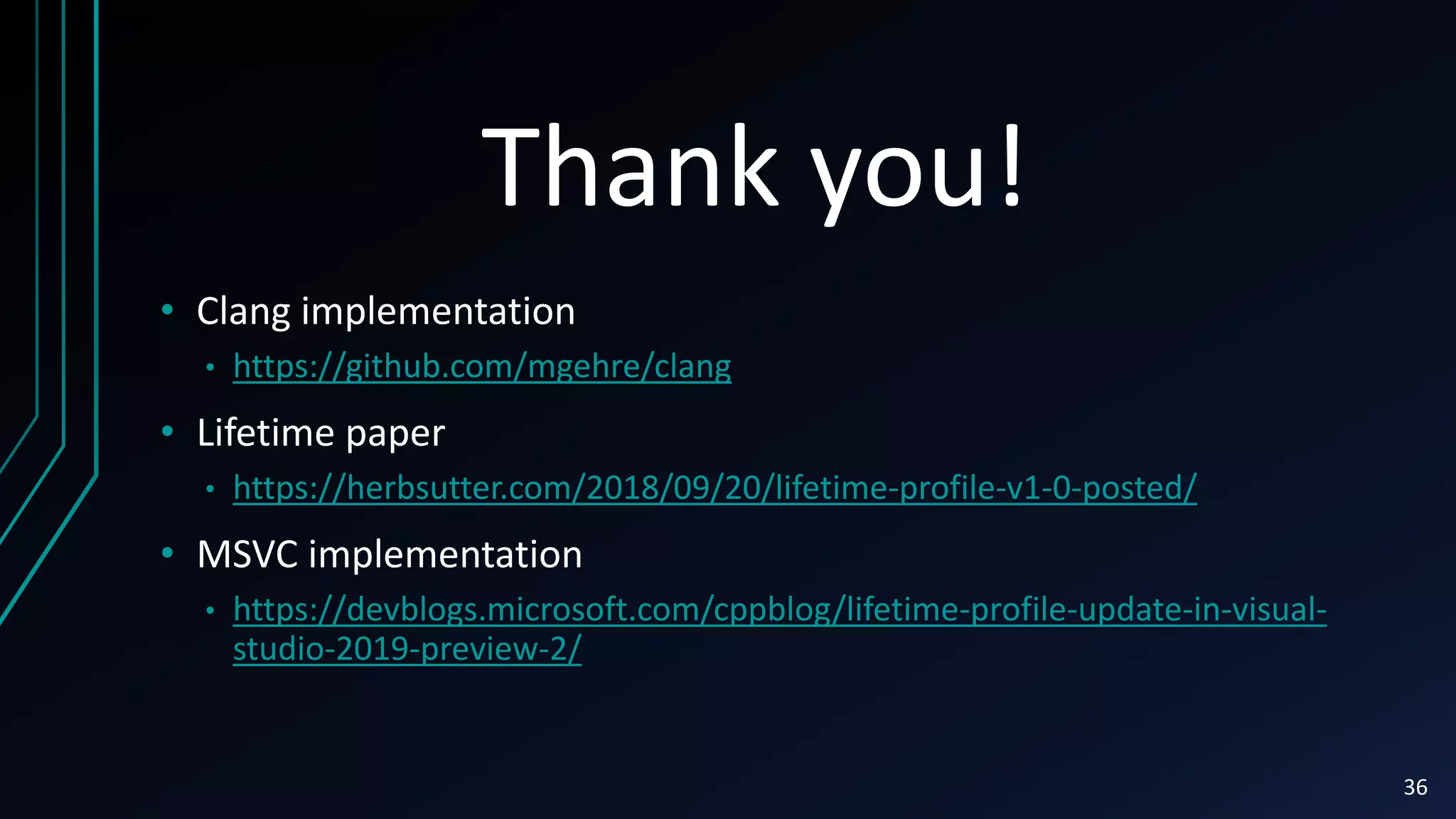The document provides an update on the C++ core guidelines' lifetime safety analysis in Clang, discussing motivation, implementation details, and evaluations of static and dynamic tools to combat memory errors prevalent in C++. It explores lifetime analysis methodologies, highlights challenges with false positives, and emphasizes the importance of contextual information for accurate analysis. The conclusions suggest that enhancements in type categorization and flow-sensitive analysis can improve the robustness of the system while keeping performance overhead low.



![Motivation #2
int *p;
{
int x;
p = &x;
}
*p = 5;
string_view sv;
{
string s{“CoreHard"};
sv = s;
}
sv[0] = ‘c’;
Many static tools warn for the left snippet but not for the right,
even though they are fundamentally similar.
4](https://image.slidesharecdn.com/updateonccoreguidelineslifetimeanalysis-190726061541/75/Update-on-C-Core-Guidelines-Lifetime-Analysis-Gabor-Horvath-CoreHard-Spring-2019-4-2048.jpg)






![Analysis Within
a Basic Block
• Basic blocks contain subexprs in an eval order, no AST traversal required
• End of full expression is not marked (apart from DeclStmt)
• When to invalidate Pointers to temporaries?
• Modified the CFG to include ExprWithCleanup AST nodes
• Clang Static Analyzer is another user
11
int x;
int *p = &x;
int *q = p;
2: x
3: &[B1.2]
4: int *p = &x;
5: p
6: [B1.5] (LValToRVal)
7: int *q = p;
2: {x}
3: {x}
4: pset(p)={x}
5: {p}
6: {x}
7: pset(q)={x}](https://image.slidesharecdn.com/updateonccoreguidelineslifetimeanalysis-190726061541/75/Update-on-C-Core-Guidelines-Lifetime-Analysis-Gabor-Horvath-CoreHard-Spring-2019-11-2048.jpg)
![Analysis Within
a Basic Block
• Basic blocks contain subexprs in an eval order, no AST traversal required
• End of full expression is not marked (apart from DeclStmt)
• When to invalidate Pointers to temporaries?
• Modified the CFG to include ExprWithCleanup AST nodes
• Clang Static Analyzer is another user
12
int x;
int *p = &x;
int *q = p;
2: x
3: &[B1.2]
4: int *p = &x;
5: p
6: [B1.5] (LValToRVal)
7: int *q = p;
2: {x}
3: {x}
4: pset(p)={x}
5: {p}
6: {x}
7: pset(q)={x}](https://image.slidesharecdn.com/updateonccoreguidelineslifetimeanalysis-190726061541/75/Update-on-C-Core-Guidelines-Lifetime-Analysis-Gabor-Horvath-CoreHard-Spring-2019-12-2048.jpg)
![Analysis Within
a Basic Block
• Basic blocks contain subexprs in an eval order, no AST traversal required
• End of full expression is not marked (apart from DeclStmt)
• When to invalidate Pointers to temporaries?
• Modified the CFG to include ExprWithCleanup AST nodes
• Clang Static Analyzer is another user
13
int x;
int *p = &x;
int *q = p;
2: x
3: &[B1.2]
4: int *p = &x;
5: p
6: [B1.5] (LValToRVal)
7: int *q = p;
2: {x}
3: {x}
4: pset(p)={x}
5: {p}
6: {x}
7: pset(q)={x}](https://image.slidesharecdn.com/updateonccoreguidelineslifetimeanalysis-190726061541/75/Update-on-C-Core-Guidelines-Lifetime-Analysis-Gabor-Horvath-CoreHard-Spring-2019-13-2048.jpg)
![Analysis Within
a Basic Block
• Basic blocks contain subexprs in an eval order, no AST traversal required
• End of full expression is not marked (apart from DeclStmt)
• When to invalidate Pointers to temporaries?
• Modified the CFG to include ExprWithCleanup AST nodes
• Clang Static Analyzer is another user
14
int x;
int *p = &x;
int *q = p;
2: x
3: &[B1.2]
4: int *p = &x;
5: p
6: [B1.5] (LValToRVal)
7: int *q = p;
2: {x}
3: {x}
4: pset(p)={x}
5: {p}
6: {x}
7: pset(q)={x}](https://image.slidesharecdn.com/updateonccoreguidelineslifetimeanalysis-190726061541/75/Update-on-C-Core-Guidelines-Lifetime-Analysis-Gabor-Horvath-CoreHard-Spring-2019-14-2048.jpg)
![Analysis Within
a Basic Block
• Basic blocks contain subexprs in an eval order, no AST traversal required
• End of full expression is not marked (apart from DeclStmt)
• When to invalidate Pointers to temporaries?
• Modified the CFG to include ExprWithCleanup AST nodes
• Clang Static Analyzer is another user
15
int x;
int *p = &x;
int *q = p;
2: x
3: &[B1.2]
4: int *p = &x;
5: p
6: [B1.5] (LValToRVal)
7: int *q = p;
2: {x}
3: {x}
4: pset(p)={x}
5: {p}
6: {x}
7: pset(q)={x}](https://image.slidesharecdn.com/updateonccoreguidelineslifetimeanalysis-190726061541/75/Update-on-C-Core-Guidelines-Lifetime-Analysis-Gabor-Horvath-CoreHard-Spring-2019-15-2048.jpg)
![Analysis Within
a Basic Block
• Basic blocks contain subexprs in an eval order, no AST traversal required
• End of full expression is not marked (apart from DeclStmt)
• When to invalidate Pointers to temporaries?
• Modified the CFG to include ExprWithCleanup AST nodes
• Clang Static Analyzer is another user
16
int x;
int *p = &x;
int *q = p;
2: x
3: &[B1.2]
4: int *p = &x;
5: p
6: [B1.5] (LValToRVal)
7: int *q = p;
2: {x}
3: {x}
4: pset(p)={x}
5: {p}
6: {x}
7: pset(q)={x}](https://image.slidesharecdn.com/updateonccoreguidelineslifetimeanalysis-190726061541/75/Update-on-C-Core-Guidelines-Lifetime-Analysis-Gabor-Horvath-CoreHard-Spring-2019-16-2048.jpg)
![Analysis Within
a Basic Block
• Basic blocks contain subexprs in an eval order, no AST traversal required
• End of full expression is not marked (apart from DeclStmt)
• When to invalidate Pointers to temporaries?
• Modified the CFG to include ExprWithCleanup AST nodes
• Clang Static Analyzer is another user
17
int x;
int *p = &x;
int *q = p;
2: x
3: &[B1.2]
4: int *p = &x;
5: p
6: [B1.5] (LValToRVal)
7: int *q = p;
2: {x}
3: {x}
4: pset(p)={x}
5: {p}
6: {x}
7: pset(q)={x}](https://image.slidesharecdn.com/updateonccoreguidelineslifetimeanalysis-190726061541/75/Update-on-C-Core-Guidelines-Lifetime-Analysis-Gabor-Horvath-CoreHard-Spring-2019-17-2048.jpg)
![Analysis Within
a Basic Block
• Basic blocks contain subexprs in an eval order, no AST traversal required
• End of full expression is not marked (apart from DeclStmt)
• When to invalidate Pointers to temporaries?
• Modified the CFG to include ExprWithCleanup AST nodes
• Clang Static Analyzer is another user
18
int x;
int *p = &x;
int *q = p;
2: x
3: &[B1.2]
4: int *p = &x;
5: p
6: [B1.5] (LValToRVal)
7: int *q = p;
2: {x}
3: {x}
4: pset(p)={x}
5: {p}
6: {x}
7: pset(q)={x}](https://image.slidesharecdn.com/updateonccoreguidelineslifetimeanalysis-190726061541/75/Update-on-C-Core-Guidelines-Lifetime-Analysis-Gabor-Horvath-CoreHard-Spring-2019-18-2048.jpg)
![Analysis Within
a Basic Block
• Basic blocks contain subexprs in an eval order, no AST traversal required
• End of full expression is not marked (apart from DeclStmt)
• When to invalidate Pointers to temporaries?
• Modified the CFG to include ExprWithCleanup AST nodes
• Clang Static Analyzer is another user
19
int x;
int *p = &x;
int *q = p;
2: x
3: &[B1.2]
4: int *p = &x;
5: p
6: [B1.5] (LValToRVal)
7: int *q = p;
2: {x}
3: {x}
4: pset(p)={x}
5: {p}
6: {x}
7: pset(q)={x}](https://image.slidesharecdn.com/updateonccoreguidelineslifetimeanalysis-190726061541/75/Update-on-C-Core-Guidelines-Lifetime-Analysis-Gabor-Horvath-CoreHard-Spring-2019-19-2048.jpg)








 {
return a + b;
};
} string_view sv = "test"s;
S& V = *get();](https://image.slidesharecdn.com/updateonccoreguidelineslifetimeanalysis-190726061541/75/Update-on-C-Core-Guidelines-Lifetime-Analysis-Gabor-Horvath-CoreHard-Spring-2019-28-2048.jpg)







